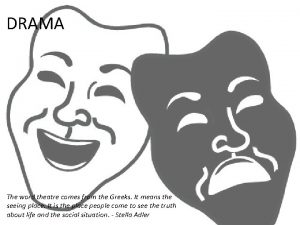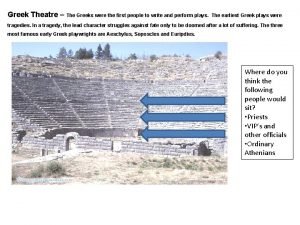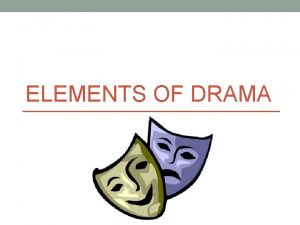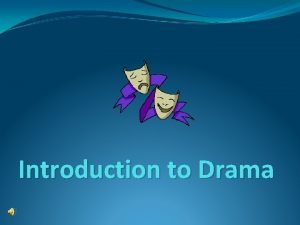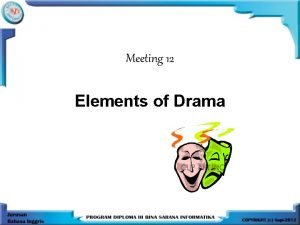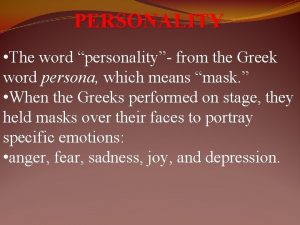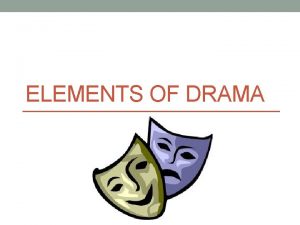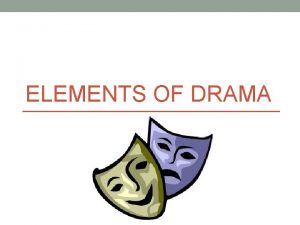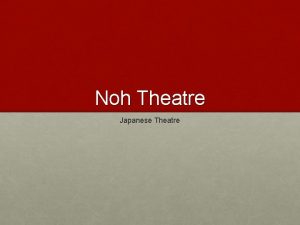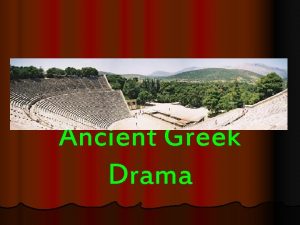DRAMA The word theatre comes from the Greeks












- Slides: 12

DRAMA The word theatre comes from the Greeks. It means the seeing place. It is the place people come to see the truth about life and the social situation. - Stella Adler

History The first plays were staged in Greece in the 5 th century BCE. The original purpose was to honor the gods, particularly Dionysus, the god of wine Drama became more about entertainment in the 1 st century AD in Rome. Drama has been used to ask questions about society, government, life, and love.

The Theme • Dramas have a central theme, which can often be considered as a question. • The theme may not always be obvious • We have to look at the meaning of the drama, and not just the events that occur

Comedy • Comedy is one of the two main genres of drama • Comedy frequently uses Satire and Parody to create humor, and at the same time criticize or question something. • Laugh, and then think

Satire is the use of humor, irony, exaggeration, or ridicule to expose stupidity or hypocrisy.

Parody is an imitation of something with a humorous message

Tragedy • Protagonist is a decent person with one flaw or fault • That fault ultimately leads to the character’s demise • Attempts to resolve problems usually backfire or make things worse Did you know: Romeo and Juliet is a tragedy?

• Written by Arthur Miller in 1953 • Set in Salem Massachusetts in 1692 -3

Literary Device: Allegory • An allegory is basically an extended metaphor • The entire story represents a key concept or idea • Allegories can often create parallels of real situations or events

The Red Scare • During the 1950 s, America experienced what was called “The Red Scare” • The Red Scare was the fear of Communism spreading to America, and taking over the world

Joseph Mc. Carthy and Mc. Carthyism Mc. Carthy was a US senator from Wisconsin • In 1950 he became famous for producing a list claiming that hundreds of people inside the government were either communist spies, or supporters. • He marketed himself as a trustworthy policeman who would protect people from communism. • Hundreds were imprisoned and at least 10, 000 lost their jobs. • Congress would later block Mc. Carthy and he died at 48 of hepatitis, alcoholism accelerated his death.

The Crucible’s Allegory • The Crucible was intended to be an allegory of Mc. Carthyism. • Pay attention for details that seem similar to the events during the Mc. Carthyism era • At the same time, look for ways to learn more about Puritan society and values
 Where does the word theatre come from
Where does the word theatre come from Greek theatres the word theatre comes from
Greek theatres the word theatre comes from The word drama comes from the greek dran which means
The word drama comes from the greek dran which means Downstage and upstage
Downstage and upstage History of drama
History of drama Parts of a greek temple
Parts of a greek temple Computer word comes from
Computer word comes from The word tessellation comes from the root word
The word tessellation comes from the root word Advent comes from the latin word adventus which means what
Advent comes from the latin word adventus which means what Structure of an italian sonnet
Structure of an italian sonnet The word revelation comes from the latin word
The word revelation comes from the latin word The word physics comes from the greek word
The word physics comes from the greek word Personality greek word
Personality greek word
